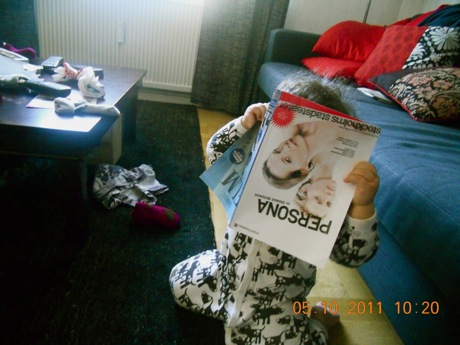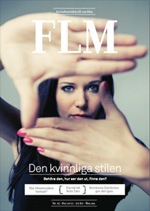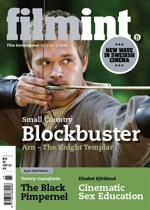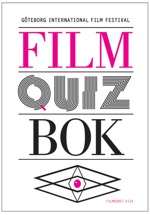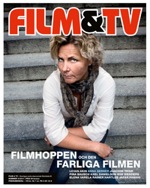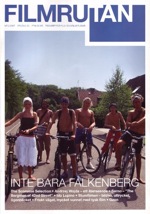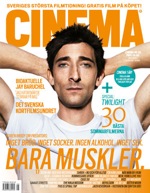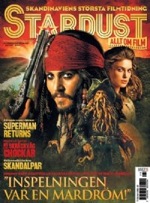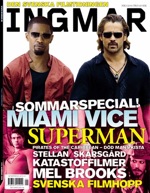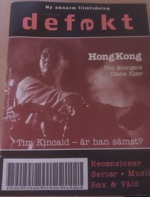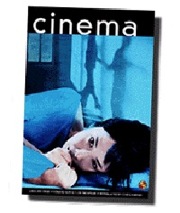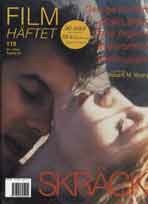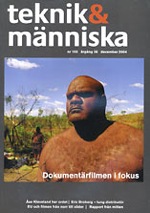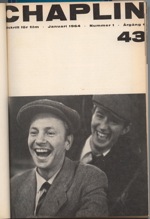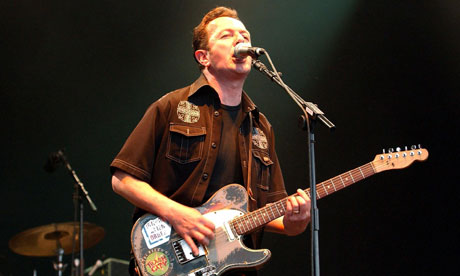London Film Festival 2011:
30 recommendations
BFI tipsar om 30 filmer som visas vid London Film Festival:
http://www.bfi.org.uk/sightandsound/newsandviews/festivals/lff-2011-recommendations.php
How to slice a festival as compendious as the LFF, with its 204 features and 110 shorts surveying much of the world’s best new cinema (and restorations) made in the past year? Consider this our first bite of the cherry: 30 fine films we’ve already seen and (mostly) written about in the magazine or on the web.
Our current November issue also looks in depth at several angles on the festival, with interviews with We Need to Talk About Kevin’s Lynne Ramsay, Jean-Pierre and Luc Dardenne and LFF Director Sandra Hebron (whose swansong this year’s festival is), as well as features on the German Dreileben triptych, the BFI’s new restoration of the 1928 British silent The First Born, the festival’s showcase of new documentaries and its discovery of two ethnically Tibetan films. The November reviews section also covers seven LFF titles which will be theatrically released soon after the festival. Tickets to many of the films below have already been snapped up during the BFI Members’ priority booking window, but we hope this list may also be of interest as a nod to films of interest emerging more widely in the ensuing months.
Looking forward, we’ll be investigating many of the festival’s works we’ve not yet seen – as well as its events and social encounters – in the form of a blog on this site. We’ll be running features on The Black Power Mixtape 1967-75 (our November Film of the Month) and the restoration of Nicholas Ray’s We Can’t Go Home Again, and surveying the new talents and voices evidenced in the festival’s Sutherland Trophy shortlist (for most original and imaginative first or second feature) and in the best of its short films. And we hope to post video clips from interviews we’ll be conducting with visiting filmmakers at the festival.
Be sure to check back regularly (or follow us on Twitter or Facebook for regular updates).
The Sight & Sound Gala

Jean-Pierre Dardenne & Luc Dardenne
Belgium-France-Italy 2011
With Thomas Doret, Cécile de France, Jérémie Renier, Fabrizio Rongione
“The Dardenne brothers may be the most consistently high-achieving filmmakers of our time – the kings, if you like, of poetic neorealism. Like all their films, Le Gamin au vélo (The Kid with a Bike) is near perfect. A fortunate accident brings neglected 12-year-old Cyril (an exceptional performance from Thomas Doret) into the life of single hairdresser Samantha (Cécile de France), who wants to help him. The boy moves in with her, but a local tough, seeing Cyril’s pugnacious nature as an opportunity, gets him to commit a robbery.
“Which way will the boy’s life go? You can never be quite sure in a Dardenne film – until you get to the end and feel the heart-rending emotional pull of their consummate storytelling.”
— Nick James, reviewing from Cannes in our July 2011 issue
The Dardennes talk to Geoff Andrew about The Kid with a Bike in our November 2011 issue, on newsstands now
Screening Friday 21, Sunday 23 October

Michel Hazanavicius
France 2011
With Jean Dujardin, Bérénice Bejo, John Goodman, James Cromwell, Malcolm McDowell
“The greatest of all the pleasures in Cannes this year was Michel Hazanavicius’s tribute to the Hollywood silent-film era – for which Jean Dujardin won the Best Actor prize. He plays George Valentin, a silent-movie star in the Douglas Fairbanks mould, with a comedy dog sidekick whose tricks win over more sceptical hearts. A collision with a young woman fan, Peppy Miller (Bérénice Bejo), in front of the press cameras gives her a start on the fame ladder.
“Hazanavicius, who made the two OSS 117 spy spoofs, Cairo: Nest of Spies and Lost in Rio, says he made The Artist because all the directors he most admires came from the silent era. There are echoes here of A Star Is Born, City Girl, Sunset Blvd. and – as Valentin seems to develop a Gene Kelly look – Singin’ in the Rain (only without the songs).
“The film is every bit as inventive as the Donen-Kelly classic – in one great scene Valentin has a nightmare with full sound effects (which we hear), but nothing will come out of his own mouth. Yes, The Artist is pure pastiche – and digital pastiche at that – but I doubt you’ll find a more light-hearted, energised and witty package in the cinema this year.”
— Nick James, reviewing from Cannes in our July 2011 issue
Screening Tuesday 18, Saturday 22 October

David Cronenberg
France-Ireland-UK-Germany-Canada 2011
With Viggo Mortensen, Keira Knightley, Michael Fassbender, Vincent Cassel
“Sigmund Freud (Mortensen), Carl Gustav Jung (Fassbender) and the largely forgotten Jewish-Russian psychoanalyst Sabina Spielrein (Knightley) form a ménage à trois of many dimensions in Cronenberg’s masterly period piece, which sets out to uncover the historical and philosophical backbone of modernity, not to mention the core of human nature…
“For all the meticulous historical framing, Cronenberg’s exploration of the irrational, and of psychoanalysis as the radical turning point in the history of the mind, offers all kinds of joyful and painful transfers into the world (and body) we live in. There’s something awesome about the delicate yet utterly open way Jung, his wife (Sarah Gadon, blissful) and his patient/mistress/true love/analyst Spielrein handle the rise and dismantling of relationships.
“The same holds true for the triangle between Jung, Spielrein and Freud, played out on the writing grounds of psychoanalytical theory. It’s a relief to return to a time when dignity and graceful manners were not considered incompatible with (to use our vocabulary) ‘hardcore’ sex.
“Even more comforting is the fact that the portrayal of Spielrein as the only character with credibility in bed and in psychoanalysis (as opposed to Jung’s esoteric erring and Freud’s asexual existence) makes A Dangerous Method that rarity, a film with a charming feminist touch.”
— Barbara Wurm, reviewing from Venice on this website
Tom Charity also reviews A Dangerous Method from the Toronto Film Festival in our November 2011 issue, on newsstands now
Screening Monday 24, Tuesday 25 October

Terence Davies
UK 2011
With Rachel Weisz, Tom Hiddleston, Simon Russell Beale
Davies’ long-awaited return to fiction filmmaking – it’s been 11 years since his adaptation of Edith Wharton’s The House of Mirth – sees him turn from novels to stage plays, specifically Terence Rattigan’s 1952 post-war passion piece, previously filmed in 1955 with Vivian Leigh and Kenneth More.
Weisz gives a remarkably compelling performance – impassioned, plaintive but proud, and more convincing than I’ve ever seen her – as Hester Collyer, who has forsaken her genteel marriage to a High Court judge (Beale) for the giddy adventure of a lopsided love affair with Hiddleston’s Freddie, an ex-RAF pilot who seems to have left his heart in the war. Despite minimal opening out – the story occupies just a handful of settings (Hester’s boarding house, her husband’s family manse, a night scene in and out of a pub and a war-time tube shelter) – the film exudes the aurora of 1940s and 50s Britain, the spit, the polish and the sense of an old world and its rules riding on empty.
It’s a signature Davies film, the intermingled time-frames, slow-prowling camera and soaring torch songs all carried off with customary élan, though perhaps they don’t seem as fresh as once they did. My main reservation was with the lengthy climactic scene, which seemed to tip the film’s delicate empathic triangle. But this is certainly a classy addition to the index of British social and emotional histories.
— Nick Bradshaw
Screening Thursday 27 October

Alexander Payne
USA 2011
With George Clooney, Shailene Woodley, Beau Bridges, Judy Greer
“George Clooney is an altogether safer bet [for an Academy Award nomination] for Alexander Payne’s The Descendants… [His Matt King is] another middle-aged husband and father who is surprised to find how peripheral he’s become to his wife and daughters.
“In the same bittersweet, tragi-farcical mode as Sideways and About Schmidt, The Descendants finds rich, pungent flavours in its authentic, often rainy Hawaiian setting, a mellow slack-key guitar soundtrack, and the confusing, conflicting dynamics that an unexpected death can inspire. Clooney’s subtle performance is among his most moving to date, while Payne, for his part, seems to have tempered his sometimes cruel satiric instincts with a more empathetic eye for frailty and fallibility. Not that he doesn’t still nail the easy lies we like to tell ourselves, but there’s a cautious optimism beneath his cynicism.”
— Tom Charity, reviewing from Toronto in our November 2011 issue
See also Nick James’s take on The Descendants in his Telluride Film Festival report
Screening Thursday 20, Sunday 23, Monday 24 October

Miles Mander
UK 1928
With Miles Mander, Madeleine Carroll, John Loder, Margot Armand, Ella Atherton
“A beautifully made late silent film drawing on all the techniques learned by successive generations of filmmakers in cinema’s formative years. Tackling sensitive ‘adult’ issues [it concerns an upper-class married couple of the political set, passionate about each other but with irreconcilable issues], The First Born shows the artistic ambition of its star and director Miles Mander.
“What’s more, it was the film that launched the career of Madeleine Carroll, later famous for her work with Hitchcock on The 39 Steps (1935) and The Secret Agent (1936). Perhaps even more significantly for us today, it’s an example of the work of one of our finest screenwriters, Alma Reville, as distinct from the better-known later work she did with Hitchcock – who was also, of course, her husband…
“What I find most fascinating about The First Born is the opportunity to see how Reville contributed to the screenplay. Tightly written, it’s full of elegant solutions, which were her particular talent. There are combinations of shots that condense the action so that what’s really quite an intimate film never feels stagy or static. On this evidence, her influence on her husband’s films may have been even greater than we thought.”
— Bryony Dixon, introducing the BFI’s new restoration of the film in our November 2011 issue
Screening Thursday 20 October

Steve McQueen
UK 2011
With Miles Mander, Madeleine Carroll, John Loder, Margot Armand, Ella Atherton
“The standout film of the festival for me was Steve McQueen’s chilly tale of sexual obsession Shame, about a corporate guy with a chic, stripped-bare New York apartment suffering from some kind of sex addiction that leads him to constantly masturbate, use prostitutes and have a laptop crammed with porn. His routine is disrupted when his sister Sissy (Carey Mulligan) turns up unannounced at his apartment. She’s a club singer whose presence clearly disturbs him, especially when she sleeps with his boss.
“Sissy prompts an amazing performance from Mulligan, especially coming after her disappointing turn in Drive. She’s never less than convincing as a New York club habitué with unfinished brother business. McQueen is very good at creating scenes that allow the actors time to really show their chops without showing off. It’s a very downbeat, tragic study of human attraction and was the first of two films starring Michael Fassbender that dominated the end of the festival for me. Fassbender himself is brilliant here, and looks like a genetic mixture of Ewan McGregor and Daniel Day Lewis with flashes of Robert De Niro – no wonder he gets cast in nearly all the promising projects.”
— Nick James, reviewing from Telluride on this website
See also Jonathan Romney’s take on Shame in a post on our Venice Film Festival blog – and Kieron Corless’s Venice review in our November 2011 issue, on newsstands now
Screening Friday 14, Saturday 15 October

Yorgos Lanthimos
Greece 2011
With Aggeliki Papoulia, Aris Servetalis, Johnny Vekris, Ariane Labed
“Alps feels closer to Lanthimos’s first film Kinetta [than to his second, Dogtooth] in its focus on bizarre group rituals and dynamics – in this case among a small cadre of men and women called Alps (the leader is Mont Blanc), who run a service to impersonate the just-deceased in order to help grieving relatives come to terms with their loss and move on.
“In its grasp of off-kilter psychology, the depth and coherence of its absurdist vision, the rigour and precision of its execution, and the brilliance of its governing premise, this was definitely the best film I saw in Venice. Lanthimos deservedly won the Best Screenplay prize, together with his co-writer Efthimis Filippou, and he could well have got the Golden Lion too.”
— Kieron Corless, reviewing from Venice in our November 2011 issue
See also Gabe Klinger and Barbara Wurm’s takes on Alps in posts on our Venice Film Festival blog
Screening Sunday 16, Tuesday 18 October

Aleksandr Sokurov
Russia 2011
With Johannes Zeiler, Anton Adasinsky, Isolda Dychauk, Georg Friedrich, Hanna Schygulla
“A loose, technically flawless adaptation of Goethe’s text, and a fitting end to the director’s tetralogy of power (although you could argue it’s the opening to it, and philosophically an opening-out). Those three previous films – Moloch (1999), Taurus (Telets, 2001) and The Sun (Solntse, 2005), on Hitler, Lenin and Hirohito respectively – were all far more low-key and reined-in than this baroque leviathan.
“Sokurov’s relentlessly roaming camera ushers us into every nook of a vividly realised medieval German town, where the poverty-stricken, tormented Faust plies his trade as a doctor too penniless to afford food, let alone the bodies he needs to dissect in his quest for the location of the soul. As in Alps [above], there’s a preoccupation with language, although differently focused; whereas in Alps it served to reveal the characters’ disconnectedness, Sokurov dwells on language’s dense materiality, its cascading shapes and rhythms, woven by Faust as he talks himself ever nearer to the perdition dangled before him by the town’s diabolical moneylender.”
— Kieron Corless, reviewing from Venice in our November 2011 issue
Screening Monday 24, Thursday 27 October

Bruno Dumont
France 2011
With David Dewaele, Alexandra Lematre, Valérie Mestdagh, Sonia Barthélémy
“A teenage goth girl living on a farm has befriended a shaman-like stranger, who’s camped in the sand dunes of the Pas de Calais coast. He prays to the horizon and then commits an act of summary justice on the farmer (her father or stepfather? – we never find out, but somehow we presume sexual abuse to be involved). This is the first of many ambiguous actions that could be interpreted as the work either of Satan or of Christ.
“In this elliptical parable, with its nod to the novels of George Bernanos, Dumont’s mysticism seems less risible than usual. That’s not to say that it’s altogether believable, but this is a coherent and beautiful parable of a kind you could imagine Pasolini making.”
— Nick James, reviewing from Cannes in our July 2011 issue
See also Geoff Andrew’s take on Hors Satan in a post on our Cannes Film Festival blog
Screening Saturday 22 October

Hirokazu Kore-eda
Japan 2011
With Maeda Koki, Maeda Ohshiro, Ohtsuka Nene, Odagiri Joe, Harada Yoshio
Kore-Eda’s latest feature is one of the most impressive films about children and their view of familial and societal structures I have seen. Koichi (Maeda Koki), a young boy living with his mother and grandparents after his parents marriage has failed, laments the absence of his younger brother Ryu (Maeda Oshiro, Koki’s real life brother), who is living with his slacker guitarist father in a distant town. Koichi is a natural ringleader of boys, whereas Ryu tends to attract female friends.
The first half of the film sketches out their separate worlds in telling observations of tremendous resonance. The restless Koichi hears that it’s a wish-granting opportunity to be present when the bullet trains cross a new line for the first time at Kumamoto. So he arranges to meet Ryu at the station so they can both wish for the reuniting of their parents. What transpires is charming without being sentimental, and gives a tremendous sense of what growing up in Japan today might be like. Brimful of great quiet shots and casual but apt one-liners, this may well be a candidate for future best film lists.
— Nick James
Screening Saturday 15, Monday 17 October

Sean Durkin
USA 2011
With Elizabeth Olsen, Brady Corbet, Hugh Dancy
“A young woman, Martha (Elisabeth Olsen), breaks free from a cult commune and escapes to the lakeside house of her well-off sister (Sarah Paulson). We learn pretty quickly that Martha has been systematically raped by the cult leader (John Hawkes), but her sister’s super-capitalist lifestyle as the wife of a British businessman (Hugh Dancy) now feels wrong to her. It’s while she sleeps that we learn, in magic-hour Malick-like fragments, just how sinister and implacable the cult is.
“The elegiac atmosphere of Days of Heaven and parts of Badlands is an obvious touchstone for Durkin, but the lakeside location so redolent of the US version of Funny Games – plus the presence of Brady Corbet as one of the cult members – makes the film seem as much under Michael Haneke’s sway. And, like Haneke, Durkin is brilliant at withholding comforting information.”
— Nick James, reviewing from Cannes in our July 2011 issue
Screening Friday 21, Saturday 22, Monday 24 October

Markus Schleinzer
Austria 2011
With Michael Fuith, David Rauchenberger
“The paedophile lifestyle drama Michael is, on the surface at least, calm almost throughout. With its superfine control of a stripped-down mise en scène (a typical trait of modern Austrian cinema), Markus Schleinzer’s directorial debut gives us a well-drawn quotidian portrait of a nervy, owlish man who happens to have a male child imprisoned in his basement. Showing how close to ordinary people paedophiles can be, Schleinzer finds room in his otherwise chilly film for pathos, humour and left-field accidents. It’s an appropriately quiet sort of tour de force.”
— Nick James, reviewing from Cannes in our July 2011 issue
Screening Thursday 20, Friday 21, Sunday 23 October

Gerardo Naranjo
Mexico-USA 2011
With Stephanie Sigman, Irene Azuela Noe Hernández James Russo José Yenque
“If you prefer crime movies with a more political perspective and a deeper sense of character, then the best on offer in Cannes was Miss Bala, from the director of I’m Going to Explode. Jessica (Irene Azuela), a lanky beauty from a poor family, wants to get into the team for the local pageant. Her friend gets her to come along to a nightclub full of off-duty cops, where they hope to get noticed – but a gang raids the club, intending to kill everyone inside. Jessica escapes, but when she tries to tell a cop what she has witnessed, he delivers her to the gang.
“From here on in, our passive and perpetually terrified heroine is made to endure all sorts of trials, which take her across the US border and back. But this is a film where what’s going on around Jessica is just as important as her own crisis. It feels like an authentic portrait of life on the edge in violent Mexico.”
— Nick James, reviewing from Cannes in our July 2011 issue
Paul Julian Smith explores Miss Bala in our November 2011 issue, on newsstands now
Screening Wednesday 19, Thursday 20, Saturday 22 October

Nuri Bilge Ceylan
Turkey-Bosnia-Herzegovina
With Muhammet Uzuner, Yilmaz Erdogan, Taner Birsel, Firat Tanis
“Ceylan’s super-subtle ultra-slow burn of a crime film requires one’s powers of concentration to be at their sharpest as we witness a three-vehicle police team being led through the dusk by the perpetrators of a murder, to find the corpse of their victim buried somewhere in the hills.
“A change in style for Ceylan after the thunderous noir of Three Monkeys (2008), it’s shot in a more plainly realist style. The drama shifts in a relay from character to character – from explosive veteran cop to terrified killer to troubled investigator to haunted doctor. As the investigation takes all night, the film comes to feel like a rumination on storytelling, told as if round a campfire. Ceylan saves up and delivers his jewel-like surprises with the precision of a Chekhov – and I can’t wait to see it a second time.”
— Nick James, reviewing from Cannes in our July 2011 issue
See also Geoff Andrew’s take on Hors Satan in a post on our Cannes Film Festival blog
Screening Monday 17 October

Justin Kerzel
Australia 2011
With Lucas Pittaway, Daniel Henshall, Louise Harris, Craig Coyne, Richard Green
“Based on a notorious true-crime case in Australia and shot where it happened, Justin Kurzel’s film has a fierce, unrelenting power. An accusation of paedophilia against a neighbour brings an intense new father figure, John Bunting (an electrifying Daniel Henshall), into the life of 16-year-old Jamie Vlassakis (newcomer Lucas Pittaway). Jamie’s mother has brought Bunting in to deal with the ‘filthy pervert’ – her ex.
“Bunting gets Jamie involved in the intimidation by having him help dump chopped-up bits of kangaroo all over the neighbour’s front porch and spray ‘fag’ on his windows. The neighbour moves out, but it’s not long before Bunting’s homicidal instincts are turned to others – the general atmosphere of street vengeance seems to give him carte blanche, and Jamie gets increasingly sucked into his grim and gruelling, hysterically violent world.”
— Nick James, reviewing from Cannes in our July 2011 issue
Screening Monday 17, Tuesday 18 October

Jeff Nichols
USA 2011
With Michael Shannon, Jessica Chastain, Shea Whigham, Katy Mixon, Kathy Baker
“A powerful film about prophecy that has strong links to Malick’s The Tree of Life. First, there’s the presence of Jessica Chastain as Samantha LaForche, once again playing a staunch and radiant red-headed mother who stands by her difficult husband while protecting their daughter (though Nichols’s film is set in the present, not the 1950s).
“Curtis LaForche (the magnificent Michael Shannon) is a drilling-rig worker who begins to have nightmares about a coming catastrophe. Since his mother was long ago diagnosed as a paranoid schizophrenic, he responds in two contradictory ways: he seeks the help of a therapist, but at the same time ruinously borrows money to expand and equip their storm shelter.
“In the moments when the family pulls together, you see the potential in Samantha to take over completely – a likely outcome if it’s economic disaster that hits the blue-collar family, rather than the chorus line of twisters that haunts Curtis’s dreams. We even see the same portent of starlings doing the twisting skipping-rope in the sky that we saw in The Tree of Life – except that these starlings swoop to attack. Take Shelter wears its debt to Malick with pride, but Nichols also taps into a spreading mood of quiet fear about a planet threatened by natural disasters, and nails contemporary anxiety about the out-of-control world economy just as powerfully.”
— Nick James, reviewing from Cannes in our July 2011 issue
Screening Friday 21, Sunday 23 October

Paolo Sorrentino
Italy-France-Ireland-USA 2011
With Sean Penn, Judd Hirsch, Frances McDormand, Harry Dean Stanton
“This new English-language film is simply Sorrentino’s most exuberant and wayward yet. Sean Penn proves at last that he has a sense of humour by kitting himself up like The Cure’s Robert Smith to play Cheyenne, a retired rock star who lives in jaded splendour in Dublin. After revealing that Cheyenne is from a New York Orthodox Jewish background (you’d think nothing could be more goyish than a goth), Sorrentino sends him, with his little suitcase on wheels, across America to track down a Nazi in hiding.
“Some viewers found the film preposterous and unfocused, but the whole point of a road movie is that it should take you to unexpected places. This one certainly did, with an astonishing David Byrne concert sequence, a Harry Dean Stanton cameo that nods to Paris, Texas, and home scenes (with Frances McDormand as Cheyenne’s cheerfully supportive wife) suggesting that Sorrentino is a close watcher of The Osbournes. Flamboyantly shot by DP Luca Bigazzi, This Must Be the Place crackles with imagination – it must be the most energetic film ever made about a chronically fatigued protagonist.”
— Jonathan Romney, reviewing from Cannes in our July 2011 issue
Screening Wednesday 26, Thursday 27 October

Carol Morley
UK 2011
Documentary, with Zawe Ashton
“Carol Morley’s unnerving tragedy sleuths the case of Joyce Carol Vincent, a popular woman who – in 2003, aged 38 – died in her flat overlooking Wood Green Shopping City, with the TV on. Her body was only discovered three years later. How could this happen? Where were her friends, neighbours, the council, etc? In passing, Morley’s film paints an unflattering picture of broken civic ties – her camera repeatedly pans from the shopping centre’s neon lodestar to the unloved single-storey flat beside it – but the riddle wrapped in the mystery is Joyce herself, a friendly, sexy but elusively private chameleon of a woman who was the acme of an atomised individual.
“Morley advertised to find many of her interviewees – Joyce’s former friends, boyfriends and colleagues – and converses with them across the camera, often telling them her own investigative findings as well as receiving their testimonies. (All this is edited with a beautiful rhythm.) But she also directs eerie re-enactments, both of the eventual discovery of Joyce’s body in her (real?) cobwebbed flat and, more imaginatively, of scenes from her life using a child and an adult actor – surrogates for a cipher. Their images perceptually fill the vacancy in our comprehension of Joyce’s life; they’re seductive like fiction, but though we may resist, that leaves us back facing the void of a life that slipped through people’s fingers.”
— Nick Bradshaw, rounding up the new documentaries in the London Film Festival – including a trio of formally inventive British films – in our November 2011 issue
Screening Sunday 16, Tuesday 18 October

Christian Petzold / Dominik Graf / Christoph Hochhäusler
Germany 2011
With Jacob Matschenz, Luna Mijovic, Vijessna Ferkic / Jeanette Hain, Susanne Wolff, Misel Maticevic /
Stefan Kurt, Eberhard Kirchberg, Imogen Kogge
“A trio of linked films independently directed by Dominik Graf, Christian Petzold and Christoph Hochhäusler [following a summer-long marathon email exchange about everything from the putative ‘Berlin School’ to the strict separation between commercial and festival films], Dreileben premiered in Berlin to surprisingly muted acclaim, but has since been gathering attention at festivals, including Locarno, where I saw it in August.
“Centring on a single premise – a convicted serial killer on the run near a fictional town in the middle of the Thuringian forest – it’s undoubtedly one of the most ambitious and exciting cinematic events of the year. While the films work on their own, they are best viewed as a triptych; together, they offer a splintered, interlinking narrative with characters casually appearing from film to film, but without that gratuitous Iñárritu-style sense of interconnectivity. The Belgian director Lucas Belvaux may have tried something not dissimilar with his 2002 trilogy One, Two and Three, but Dreileben comes across less as a puzzle to be pieced together than as a gradually unravelling tapestry.”
— Isabel Stevens, introducing the triptych in our April 2011 issue
Screening Saturday 15, Sunday 17, Tuesday 18, Wednesday 19 October

Ulrich Köhler
Germany-France-Netherlands 2011
With Pierre Bokma, Jean-Christophe Folly, Jenny Schilly, Hippolyte Girardot
“Schlafkrankheit (Sleeping Sickness), a Conradian portrait of a burnt-out white man addicted to Africa, surprised constantly with an oblique approach to mood and storytelling that seemed to mimic the continent’s unknowability. A hard-to-like German doctor (played with an epic sense of exhaustion by Pierre Bokma) is preparing to leave Africa with his family after 20 years’ service, but finds he cannot go. Two years later, a visiting black Frenchman (Jean-Christophe Folly) discovers that the doctor has now become part of the corruption against which he once railed. The jury was right to pick out Ulrich Köhler for the Best Director prize.”
— Nick James, reviewing from Berlin in our April 2011 issue
Screening Thursday 20, Friday 21, Saturday 22 October

Alexander Zeldovich
Russia 2011
With Maxim Sukhanov, Justine Waddell, Vitaly Kischenko, Danila Koslovsky, Daniela Stoyanovich
“The one film I saw this year that can genuinely be called a UFO is a Russian science-fiction extravaganza, shown in the Panorama section. Target (Mishen) – ‘The Target’ would be a better translation, to make it sound less like an action thriller – is an extraordinary, flamboyant, hugely ambitious chunk of dystopian futurism. It’s set in Russia in 2020, when the rich are even richer than now, when Chinese influence is in the ascendent, and there’s a superhighway running across the continent direct from Guangzhou to Paris…
“A sumptuously-designed, constantly surprising piece, Target uses the science-fiction genre rather in the way that Alphaville, Stalker and Fahrenheit 451 did, to philosophical effect – although in this case the production values are on a much more sumptuous, Spielbergian / Kubrickian level. Some of the social satire, notably some Fellini-style TV sequences, is heavy-handed, but Target is distinctive in being at once modernistically sleek and traditionally Russian; along with some Solaris-style oases of ruralism, this is one of those films where characters intermittently recite Lermontov poems to each other.
“Part state-of-the-nation comment, part disquisition on good, evil, mortality and desire, and wholly a genre cult attraction extraordinaire, Target is a fabulously imaginative work. I’ve never previously encountered director Alexander Zeldovich, although he’s been around a while. Anyway, I’d love some bold UK distributor to take on a film so audaciously defiant of market logic, flouting established genre and art-house logic alike.”
— Jonathan Romney, reviewing from Berlin on this website
Screening Tuesday 25, Wednesday 26 October

Pablo Giorgelli
Argentina-Spain 2011
With Germán de Silva, Hebe Duarte, Nayra Calle Mamani
Argentine documentarist Pablo Giorgelli’s first feature, winner of the Camera d’Or at Cannes this year, is a slow-burning beauty. Lorry driver Ruben is tasked by his boss with taking a Guarani woman, Jacinta, and her baby across the border from Panama to Buenos Aires to stay with her cousins (and work illegally, it’s implied). At first Ruben seems like one of Lisandro Alonso’s solo men, withdrawn and at odds with the world, resentful at the baby’s presence. Gradually, though, a subtle shift takes place.
There are several wondrous elements to Las Acacias. One is the cinematography, not least its intricate negotiation of the most confined space imaginable, and its mapping of Ruben and Jacinta’s growing intimacy – two of life’s stoics sussing each other out slowly, more often than not wordlessly. We glimpse into their pasts, but nothing more; hints at dark stuff – the scar on his back, the baby having no father. The performances, by non-professionals, are perfectly pitched, astonishing. But more than that, both actors are warm, real, lived-in presences, people you want to spend time with and get to know.
It’s also another glimpse into Argentine life outside the capital, the roadside stops and trucker life grounding the film in a social reality. I’ve heard this film described as slight, but I’d beg to differ. So much is understated or unspoken – the racial politics, the poverty, isolation – but it’s all there up on the screen. Ultimately, too, there’s the possibility of love, two (or even three) lives transforming – what could be bigger than that?
— Kieron Corless
Screening Monday 17, Tuesday 18 October

Milagros Mumenthaler
Argentina-Switzerland 2011
With María Canale, Martina Juncadella, Ailín Salas Julián Tello
Mumenthaler’s debut feature scooped both the Golden Leopard and the Fipresci award at this year’s Locarno Film Festival and heralds the director as yet another promising talent from Argentina. Throughout this spare, melancholic film, she guards her narrative secrets – only gradually does it emerge that the three lost and bickering souls living under one roof are orphaned sisters mourning the death of the grandmother who has raised them.
The action never leaves the grand but neglected family home. The camera beautifully stalks its rooms and contents and the piles of possessions – constant reminders of the past – that surround the sisters.
It’s a film where very little actually happens; mood and characters are Mumenthaler’s main priorities. With her preference for low light and a soft focus, a languid end-of-summer aimlessness hangs over the film. Meanwhile she patiently observes every snide comment and questioning stare shared between the three sisters, revealing clashing personalities and exploring in detail the dynamic between them.
— Isabel Stevens
Screening Saturday 15, Tuesday 18 October

Hong Sangsoo
South Korea 2011
Yu Junsang, Kim Sangjoong, Song Sunmi, Kim Bokyung
Having long ago moved away from the scripted complexities of his initial hit The Day the Pig Fell Down the Well towards a more semi-improvisatory approach to filming the social life of his often semi-autobiographical protagonists, Hong has hit a productive groove in recent years with tales of brief encounters that often lead to social embarrassment.
But while The Day He Arrives does play narrative games of a similar kind to those that have enlivened his recent films such as Like You Know It All (2009), Oki’s Movie (2010) and HaHaHa (2010), it feels much more sombre in tone, and that’s not just down to the choice of a monochrome palette. The idea of showing the same day rerun with different consequences each time here dodges the moral weight a Kieslowski would give it but finds a rather more poignant sense of dysfunction and melancholy. There’s a feeling about this film that the director is pushing himself harder than ever.
— Nick James
Screening Friday 14, Sunday 16 October

Ann Hui
Hong Kong 2011
With Deanie Ip, Andy Lau, Wang Fuli, Qin Hailu, Anthony Wong
Ann Hui’s quiet and tender, yet also often humorous and forthright, new film has the humane understanding of people and familial relationships that has long marked the work of the veteran Hong Kong director, who made her first feature The Secret back in 1979 and, alongside Tsui Hark, Patrick Tam and others, was one of the leading voices in the Hong Kong New Wave of the late 1970s and 1980s.
Her latest is partly based on a true episode in the life of the film’s screenwriter, Roger Lee. It follows Roger (Andy Lau), an unfailingly calm and polite yet razor-sharp film producer. His family all live abroad, so Roger lives alone, helped by Ah Tao (Deannie Ip), the seventysomething amah (domestic helper) whose quietness masks a similar sharpness, and who has worked loyally for his family for many generations. Their roles are suddenly reversed when Ah Tao suffers a stroke and asks Roger to put her into an old people’s home, and we watch as she adjusts to her new environment and its quirky, sometimes bothersome, elderly inhabitants. At the same time Roger finds new rewards and depth to his life though caring for her, and their relationship becomes more emotionally intimate and mutually supportive.
If that all sounds like a recipe for cloying sentiment, it’s Hui’s achievement that – save perhaps in Law Wing-fai’s score – the emotion never feels forced, and the film maturely explores issues about aging, caring for our elders and the dynamics of class relations without manipulation. Lau and Ip have played mother and son many times before, and work together with great sympathy. There are also a number of cameos from other luminaries of Hong Kong cinema to watch out for, Tsui Hark among them.
— James Bell
Screening Tuesday 25, Thursday 27 October

Jafar Panahi, Mojtaba Mirtahmasb
Iran 2011
With Jafar Panahi
“Smuggled into France on a USB flash drive rumoured to have been hidden in a cake, Jafar Panahi and Mojtaba Mirtahmaseb’s In Film Nist (This Is Not a Film) gave the Cannes festival – and moviemaking itself – an incontestable reason for being. Viewed under any circumstances, the movie (a more appropriate designation than the ‘film’ of the title, since it’s an entirely digital production) would merit a high place among the great works of Iranian cinema and modernist (ie reflexive) documentary. Posed against the deadly serious grandiosity of Terrence Malick’s The Tree of Life and the ironically apocalyptic psychodramatics of Lars von Trier’s Melancholia, Panahi’s extreme poverty of means (the movie was shot with a modest digital camera and a cellphone) could not have represented a starker contrast.
“The forced limitation of the mise en scène (Panahi is under house arrest in his flat), the brilliance of his associative ruminations on the ontology of film and filmmaking, the lively depiction of his daily life – where the mundane and the coincidental occasionally coalesce into evanescent metaphors – the risk entailed in making the movie (and the absolute necessity, for Panahi, of taking that risk) add up to that much overused (especially at Cannes) designation: masterpiece.”
— Amy Taubin, reviewing from Cannes in our July 2011 issue
See also Geoff Andrew and Gabe Klinger’s takes on This Is Not a Film in posts on our Cannes Film Festival blog
Screening Tuesday 18, Wednesday 19

James Benning
USA 2011
With Sompot Chidgasornpongse, Francesca Sloane, Thom Andersen, Stefan Pascher, Blake Derrington, Norma Turner, Fabian Euresti, Sharon Lockhart, Dick Hebdige, Hye Sung Moon, Dave Crane, Janet Jenkins, Tanya Barber, Kelman Duran, Suzan Pitt, Jahcobie Cosom, Margaret Haines, Suzanne Dungan
As a lifetime non-smoker (although I have inhaled a few times), the aesthetics of watching people smoke are for me a complex mixture of fascination and revulsion. Here Benning, in a tribute to Warhol (amongst other things), gets close to 20 of his friends of all ages as they each smoke through one ciggie in front of backgrounds carefully chosen for each individual, typically but not always bare.
As with painted portraits, the duration of the shots (the shortest two minutes 39 seconds; the longest seven minutes 43 seconds) allows one to switch from one fascination to another over the time span. You wonder perhaps at first about the different ways that people hold the cigarette and inhale, how some are very guarded while others are more insouciant, and how those who start tense have relaxed some by the end of the take. You might think then about hairstyles and about the way cigarettes age the skin more quickly.
Finally, I found the backgrounds began to fascinate. What is Benning trying to say about this particular chum, you ask yourself? And since this is one of the avant-garde director’s shorter observational works, you’ll still be puzzling when the last butt gets ground into the concrete.
Screening Friday 14, Saturday 15, Monday 17 October

Ben Rivers
UK 2011
With Jake Williams
“Ben Rivers’s first feature follows the director’s countless prizewinning shorts, and revisits the subject of one of them: a solitary called Jake Williams, living in a ramshackle but beautiful old house deep in the Aberdeenshire wilds. Rivers’s film situates itself in that popular and fertile liminal territory, not quite documentary, not quite fiction, observing Jake on his diurnal round – pottering, walking, sleeping, just staring into the fire or into space – and building in a few nice touches, which I won’t spoil.
“It also looks incredible; to shoot the film, Rivers bought up the final batches of his favourite black-and-white Kodak 16mm filmstock, Plus X, just before it was discontinued, and processed it by hand in his own kitchen, as is his wont. All the formal glitches on display give the film an archaic feel – and are completely integrated into the overall conception. Rivers is a massive talent, and one of the great pleasures of the century’s second decade will be seeing where he takes it.”
— Kieron Corless, reviewing from Venice in our November 2011 issue
Screening Friday 21, Monday 24 October

Barbara Loden
USA, 1970
With Loden, Michael Higgins, Frank Jourdano, Valerie Manches, Dorothy Shupenes
“I first encountered Wanda in 1971 when it played in the first New York Women’s Film Festival, where a short documentary I had made was also programmed. I thought it was remarkable, in part for the very reason many in the audience dismissed it: the titular protagonist, played by Loden herself, is anything by a feminist role model. Loden’s inspiration, she told me, when I interviewed her not long before her death in 1980, was a newspaper article about a bank robber’s accomplice who said ‘thank you’ when a judge sentenced her to 20 years. Wanda is a more fragile and bewildered version of all the trashy bad girls Loden played so brilliantly on stage and screen in productions directed by Elia Kazan, to whom she was married for over a decade. But more than a portrait of a woman who, being no man’s fantasy, had never been seen on screen before, the film, shot in 16mm by a cameraman trained in cinéma verité, is a neo-realist hybrid that combines documentary and genre fictional elements in ways that today are basic to economically precarious, artistically adventurous cinemas around the globe.”
— Amy Taubin, writing in our ‘75 Hidden Gems’ feature in our August 2007 issue
Screening Wednesday 19, Thursday 20 October

